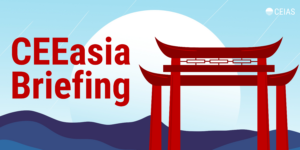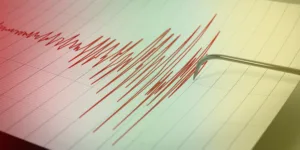Welcome to the 39th issue of the #CEEasia Briefing.
In this issue, we dissect the following topics:
- Xi visits Moscow
- Kishida’s diplomatic game in Kyiv
- Deep tech and security cooperation between Czechia and Taiwan
If you like what you see, please forward this message to your friends and colleagues who can subscribe here.
Do you need to know more about East Asia? Don’t hesitate to shoot us a message about custom analysis tailored to your needs.
1. Xi visits Moscow
What’s going on? On March 20, Chinese President Xi Jinping made his first state visit to Moscow since the start of his third term in office. He did so at the invitation of Vladimir Putin, and the visit concluded with another joint statement reiterating the importance of the Comprehensive Strategic Partnership between the two sides.
Going deeper… Despite the omission of the “no limits” partnership that appeared in the February 2022 statement (prior to the Russian invasion of Ukraine), the new statement reiterates several of the previously stated points. This includes mutual respect, peaceful coexistence and win-win cooperation, a triad which forms a basis of what Xi called “a new model of major-country relations.” In addition to the two countries’ aspirations for a new international order, the statement highlights support for each other’s national interests and also refers to China’s recent proposal for “the political settlement of the Ukraine crisis”.
Simultaneously… The events preceding and following the release of the statement highlight the growing asymmetry in the Sino-Russian relationship. Nowhere is this more obvious than the energy sector; since the war in Ukraine, Russia has grown even more economically reliant on China. Indeed, not only has China been able to purchase Russian crude oil at almost a 40 percent discount rate, but the Power of Siberia 2 gas pipeline project (which the Russian side has been pushing for) has not been confirmed during Xi’s visit. Disregarding the previous Kremlin announcements about the deal nearing its conclusion, the joint statement did not mention any explicit plans, using the vague language of making efforts to advance the study of the pipeline instead.
This means… Following the meeting, it is now becoming increasingly evident that Russia is likely to remain a junior partner in the relationship for the foreseeable future. Although China-Russia economic ties had been uneven even before the invasion, the war in Ukraine made Moscow’s position even more pronounced. Besides giving Beijing the upper hand in energy negotiations, Moscow has also adopted the renminbi as a reserve currency, with its share in Russian exports increasing eightfold since the invasion.
Further reading:
The Diplomat: China, Russia Recommit to Close Partnership in the Shadow of Ukraine War
Foreign Policy: Russia Has the Hydrocarbons, but China Has the Cash
Financial Times: Russia embraces China’s renminbi in face of western sanctions
NATO StratCom COE: Dragon’s Roar and Bear’s Howl: Convergence in Sino-Russian Information Operations in NATO Countries?
2. Kishida’s diplomatic game in Kyiv
What’s going on? On March 21, a day after Chinese President Xi Jinping arrived for an official state visit to Moscow, Japanese Prime Minister Fumio Kishida descended from a train in Kyiv. It was an unexpected visit. Although Ukraine’s President Volodymyr Zelenskyy had invited Kishida two months ago, the trip was not announced publicly. Mr. Kishida was also the last of the G7 group leaders to come to Ukraine. The main goal behind his visit remains unclear, but he did manage to highlight the formation of two contrasting geopolitical blocks.
Going deeper… Japan has been an adamant supporter of Ukraine since the outbreak of the war. It has provided $200 million in humanitarian aid and $600 million in financial support to Ukraine. It has also accepted over 2,000 Ukrainian refugees and supplied Ukraine with equipment such as helmets, bulletproof vests, and drones. Japan was also among the first countries to impose international sanctions on Russia, calling it a “serious security concern.”
Moreover… During his visit to Kyiv, Kishida told Ukrainian officials that he plans to “provide maximum support in order to restore peace in Ukraine.” But due to its pacifist constitution, Japan has not and probably will not provide Ukraine with any weapons or military support.
This means… As Japan’s military support for Ukraine is highly unlikely, some experts say Tokyo would be interested in brokering peace between the two fighting countries. Japan, which has territorial disputes over Senkaku Islands with China and the Northern Territories with Russia, is particularly concerned about the close relationship between the two countries, which have previously conducted joint military drills near Japan’s coasts. But given Japan’s strong verbal condemnation of Russia’s doing, it is far more likely that Kishida is just trying to get the world on his side and convey to the international community that Japan offers support when a like-minded country is in need.
Further reading:
CEIAS: Mixed reactions to the Russian war against Ukraine in the Indo-Pacific
CEIAS: The Impact of War in Ukraine on V4 + Japan
The Diplomat: China in Russia, Japan in Ukraine: Asian Powers Enter International Diplomacy
The Japan Times: Japan approves major defense overhaul in a dramatic policy shift
3. New domains in Czech-Taiwan cooperation?
What’s going on? The 150-member delegation led by the Czech Chamber of Deputies Speaker Markéta Pekarová Adamová has visited Taiwan. This was the largest-ever Czech delegation to do so, marking another milestone in the growing relations between the two countries.
Going deeper… In addition to its size, the delegation was also indicative of a shift to the whole-of-government, and whole-of-society, approach by Czechia towards Taiwan; the participants came from various parties across the political spectrum, as well as business, academic and security circles. The visit concluded with the signing of 11 MoUs, including a statement on bilateral parliamentary friendship, and Taiwania Capital’s approval of a $5 million investment in a Czech virtual reality firm. The European Values Center for Security Policy, the Czech think tank with an office in Taiwan, and the Czech-Taiwanese Business Chamber have also opened the Czech Hub to further strengthen Czech-Taiwanese relations across all domains.
More importantly… Cooperation in emerging and disruptive technologies (EDTs) like AI and drones was also discussed, seemingly in relation to defense and security purposes. Indeed, the delegation includes the directors of both the Security Information Service (BIS) and the National Cyber and Information Security Agency (NÚKIB). And according to press reports, the discussions about Taiwan’s purchase of missile trucks and self-propelled artillery weapons have also seen further progress.
This means… Czech-Taiwanese relations have now officially entered a new stage. The executive and legislative branches are aligned in their support for Taiwan, a significant progress from 2020 when the relations between the two began to improve. Moreover, the cooperation is also moving in a truly multi-domain direction, with its potential future security aspects being of particular importance, as it could push the EU’s security-related support for Taiwan beyond symbolic gestures and rhetoric.
Further reading:
MOFA: Czech delegation led by Chamber of Deputies Speaker Adamová signs 11 MOUs and…
Taiwan News: Taiwan nearing deal on missile trucks, self-propelled artillery from Czech Republic
CEIAS: Beyond the Dumpling Alliance: Tracking Taiwan’s relations with Central and Eastern Europe
CEIAS: Public attitudes in Taiwan-V4 relations: Solid basis, space for improvement
Quick takes on CEEasia developments
CHINA | Chinese household appliance manufacturer Hisense has launched a €2 million R&D center in the Slovenian city of Velenje, with the goal to allocate €45 million in R&D activities this year. This follows the January 2021 opening of a TV set plant in Velenje and the decision to make Slovenia Hisense’s center for the company’s business operations in Europe, with Velenje becoming its main production and development location.
SOUTH KOREA | Along with the Czech Chamber of Deputies Speaker’s trip to Taiwan (see above), the director of the National Cyber and Information Security Agency of the Czech Republic (NÚKIB) Lukáš Kintr visited South Korea to promote cooperation in cybersecurity. It was the first time in history that a director of NÚKIB visited the Korean Peninsula, discussing issues such as cybersecurity threats, possible joint exercises, cooperation with the private sector, education, and knowledge exchange.
PAKISTAN | Pakistan is reportedly planning to transfer 44 T-80UD main battle tanks to Ukraine in exchange for financial assistance from the West. The move is a part of a deal to increase defense supplies to Ukraine and could potentially enhance Pakistan’s strategic ties with the Eastern European nation.
INDIA | Company owned by the Slovak businessman Jan Sabol is building its first non-European biofuel plant in India, highlighting the increased global need for biofuels and the growing importance of Asia as a market for high-demand alternative energy sources.








